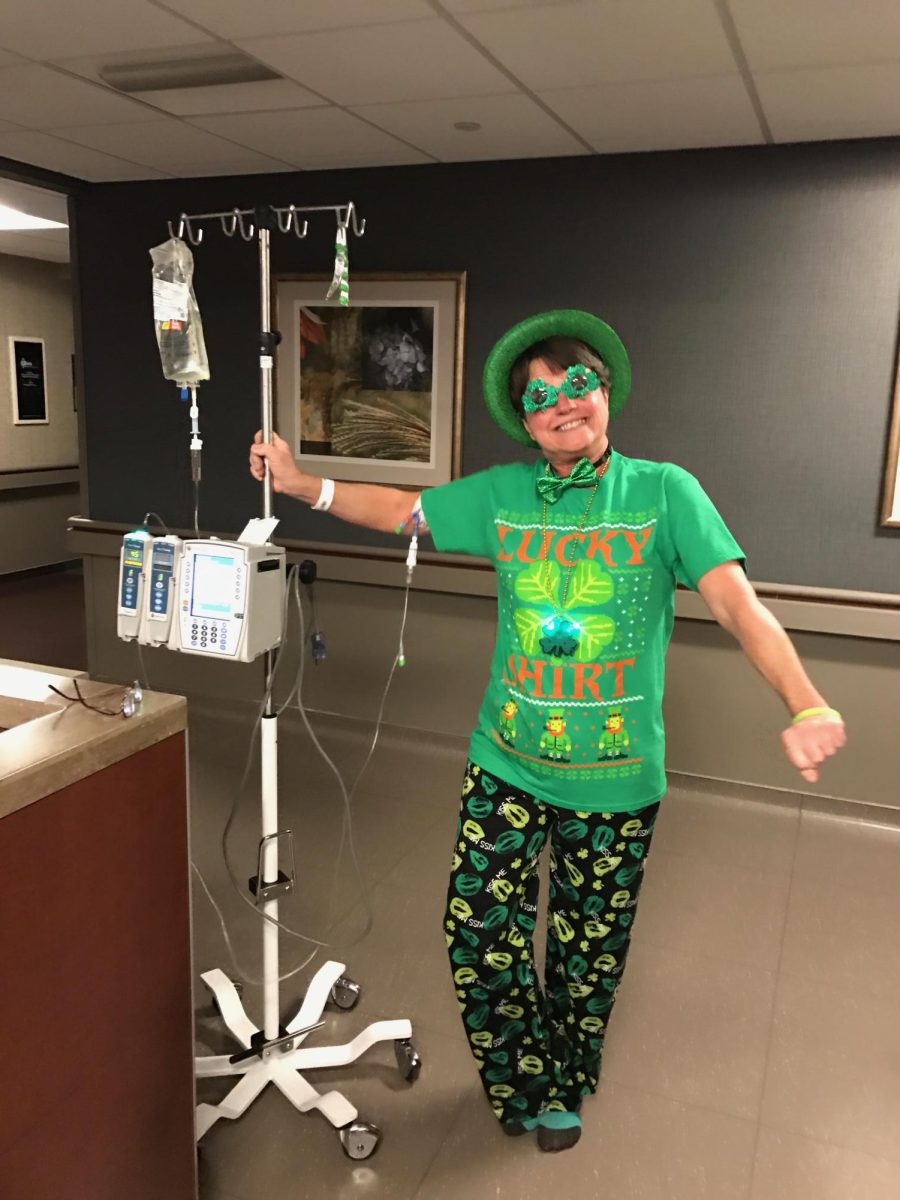Friday, April 13, 2012. An unremarkable spring day for most, but for Activities Secretary Kathy Folk, it was a day she would never forget. After experiencing severe side pain the prior weekend, a subsequent trip to the doctor’s office led to that Friday’s fateful diagnosis: stage four Non-Hodgkin’s follicular lymphoma.
“I literally felt myself melt down the wall,” Folk said.
In the next month, Folk would begin treatment at Nebraska Medicine under the care of world-renowned specialists in lymphoma, initially with Dr. James O. Armitage.
“People flew in from all around the world to see this man, and I had to drive 20 minutes,” Folk said.
Folk would achieve remission, but four years later, she would find out her cancer had returned. She began treatment with Dr. Matthew A. Lunning, who has now been treating her for the last nine years. Since her initial diagnosis, Folk has had multiple cancer recurrences and completed a variety of treatments, from chemotherapy to a stem cell transplant.
In February 2025, Folk found out that her cancer had returned for the fourth time, and along with Lunning’s recommendation, decided to do something revolutionary: outpatient CAR-T therapy.
“He said if you think you could recuperate at home, I think you would be the best candidate,” Folk said.
CAR-T therapy is a type of immunotherapy in which a person’s own immune cells are trained to destroy cancer cells. Typically, the treatment requires the patient to stay in the hospital for roughly two weeks after the infusion process, but Folk was able to qualify for the outpatient route because she could be monitored closely at home and go to the hospital for daily check-ups.
Folk was the first patient in Nebraska to complete the outpatient route for CAR-T therapy, and on Aug. 11, 2025, after clear scans, Folk was declared in remission.
“I feel like I’ve been given a new lease on life,” Folk said.
As Folk has been at MN for ten years, all of her time here has been punctuated by her cancer journey. Despite her long-standing health battle, Folk maintained unwavering support for the school community. For junior Abby Beard, a member of the softball team, Folk’s presence has made a significant impact.
“With her and her husband, every single game they come to, he yells whenever we score, saying ‘Let’s Go, Mustangs!’ super loudly, and it’s so fun and everyone cheers,” Beard said. “She just laughs, and you can just see the smile on her face; she’s just been so supportive to us during such a difficult time for her.”
A wide variety of teams, clubs, and associations have come together to support Folk. From green (the color for Non-Hodgkins lymphoma) hair ribbons the softball team donned for games to T-shirts staff members designed in support of Folk, shows of encouragement have been seen throughout the school.
“We have rallied behind her every step of her journey. When Kathy lost her hair the first time, when she came into the office, we played ‘You Are So Beautiful.’ There is nothing better than the staff here at Millard North,” secretary Theresa Rude said.
The multitude of uplifting events has fostered a positive environment for Folk.
“All of these kids and all of their energy, as well as the teachers and staff, have helped me get where I’m at,” Folk said.
The support system at school has been strengthened by Folk’s own passion for its community, having far-reaching effects.
“Her showing how much she cares and loves all of us, and just really the smile she continually puts on her face every single day…it taught myself and the team to put things in perspective, and to be thankful for every opportunity you’re given in life,” Beard said. “She just has really had a very big impact in my time at Millard North.”
Even though Folk is retiring at the end of this school year, her presence will continue to be felt not only at school but also in Omaha, as she plans to do cancer outreach work.
Now a part of Community Scientists, a program at the Fred and Pamela Buffett Cancer Center, Folk reads over cancer treatment proposals, provides feedback on advertisements, and partakes in additional advocacy work.
“You always wonder why something happens to you…this whole thing may have happened because I’m supposed to help people get this [treatment] now,” Folk said.
Folk will continue to spread awareness about her journey and unique treatment, facilitating increased knowledge surrounding cancer.
“I know a lot of people that have cancer, and they don’t want anybody to know about it. They want to go through it quietly, which is fine, but that’s not my personality,” Folk said. “I think it’s helped all of my family for me to be more outspoken because they’re not afraid…by being able to explain your story, I think it just helps people.”


